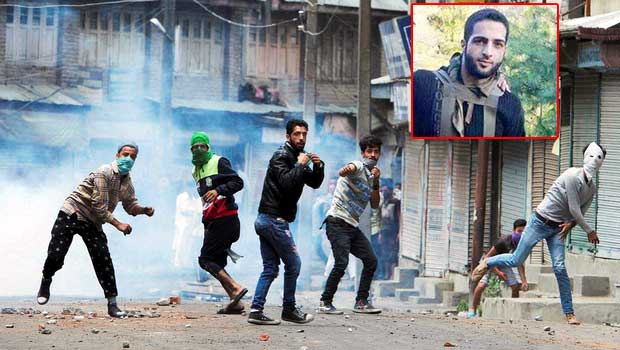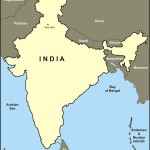Recent intelligence and media inputs are indicative of a changing trend in the Valley. Last year witnessed a quantitative increase in the number of locals picking up weapons against the state. There was a perceptible rise in encounters in villages rather than remote forest belts. Incidents of flash mobs indulging in stone throwing and directly attempting to interfere in operations to flush out terrorists, at times compelling the army to even call of the operation, have risen dramatically. The militants have been quick to respond and thanked locals for their support.
The summer has yet to commence, passes yet to open, increasing infiltration attempts, resulting in larger presence of foreign militants in the valley.
Recently militants entered the house of a senior police officer serving in the valley and threatened his family, if he continues in service. While police response was swift even stating that militants too have families in the region, who could be equally threatened, however, it appears to be just a sign of bravado. The summer has yet to commence, passes yet to open, increasing infiltration attempts, resulting in larger presence of foreign militants in the valley. The Director General BSF has supported this claim while mentioning security forces are expecting it and remain fully prepared.
Separatists have requested tourists to return to the valley, assuring them of safety. This indicates that operations against security forces would be confined to rural areas, rather than cities, as tourism affects revenue of locals and could result in loss of followers. The icing on the cake has been the sudden spurt of support which the National Conference (NC) has begun to provide to anti-national elements, including those seeking ‘Azadi’, solely to embarrass the government and security forces.
When the above is considered in totality, it does give an impression that the coming days are going to be challenging for security forces, not that it never was. The army based on its recent experiences needs to re-evaluate its strategy and prepare for the coming months. A few facts need to be considered prior to even considering options. Firstly, counter militancy operations would continue as hither to fore, irrespective if a militant is a local or a hardcore, infiltrated from Pakistan. Secondly, while anti-infiltration deployment exists in two tiers, supported with technology, there would still be some who would sneak in, especially if they have local guides. Hence the valley would become more active.
…support from the state government would remain, but would be restricted for purely political reasons as it cannot be seen to be anti local population. Thus, in summary, a tough and difficult summer lies ahead.
Thirdly, provocation and continuous support would be provided to locals by the Hurriyat and Pakistan to actively interfere and prevent security forces from succeeding. This could increase casualties to security forces as also make their task cumbersome. Fourthly, the army would continue with its two-pronged approach of employing a velvet glove alongside an iron fist. Finally, support from the state government would remain, but would be restricted for purely political reasons as it cannot be seen to be anti local population. Thus, in summary, a tough and difficult summer lies ahead.
Options open to security forces appear to be limited. It can consider swift operations, willing to accept collateral casualties by seeking to destroy buildings, where militants have been trapped by employing direct firing weapons, which it had discarded for years,rather than flush them out patiently. Another could be to could arm the central and state police personal, establishing the cordon, with pellet guns, in addition to normal weapons, to deter flash mobs, interfering in operations. Hence, civilian casualties can be expected,which could increase alienation across the valley.
It could also consider employing a smaller force to engage militants, leaving limited avenues for escape, seeking to ambush them while they escape. This may only succeed occasionally. Finally, there is always the experience, that a militant who escapes today would be gunned down tomorrow or soon after, as he would continue to be hunted.Each of the options are fraught with risk of casualties, collateral damage and partial success. Alienation of the population would happen and must be accepted.
There are other issues emerging from the changing trend which need serious consideration and coordination. J and K police is amongst the most effective and well trained force amongst its counterparts in the country. While they have their loyalties to the state, however are always burdened by threat to their families.
The months ahead are likely to be a testing period for the security forces and the government, both at the centre and the state. The government should be prepared for drastic action against separatists if they attempt to incite the population.
Most police personnel change their identity, whenever they visit home, fearing violent action from militants and locals. Yet limited employment opportunities compel them to join the service. Securing their families is the responsibility of the state and the deployed police of the region. In few cases, when threats become serious, the state may have to consider shifting families to locations away from the district. Unless the morale of the police is maintained, its active and effective participation in anti-militant operations is suspect.
Increasing collaboration by the population in ensuring militants escape confirms that locals would no longer be targets as happened earlier. Hence attacks on security forces would be on the rise. Thus, ensuring additional security at every camp and when on the move becomes imperative. Every successful militant strike would only embolden them and push more youth into their camps adding pressure on the government for retaliatory action. Further, recent incidents have corroborated the fact that informers may reduce as support to militants increase, hence security forces would need to depend more on use of electronic devices including drones and electronic surveillance.
The months ahead are likely to be a testing period for the security forces and the government, both at the centre and the state. The government should be prepared for drastic action against separatists if they attempt to incite the population. Latitude must be given to local commanders for conduct of operations. Finally, we as a nation must strongly support our forces as they face tough days ahead. We should remember that not all in the valley are anti-national, hence should avoid stereotyping the population.






There are eleven articles by this author in your publication. A search of your own search engine would prove it. However, you have only listed one. Please do justice.